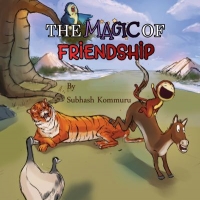Title: The Magic of Friendship
Author: Subhash Kommuru
Illustrator: Arul Anugragh Ross
Publisher: 2014, Kommuru Books
ISBN: 9780990317814
Pages: 39, Paperback
Genre: Children’s Picture Book
Reviewed by: Anita Lock, Pacific Book Review
Book Review
The Magic of Friendship is a delightful allegorical story about a gander that tells his juvenile son about a fierce tiger that incurs fear among all the animals in the Tadoba Forest. While the two prepare a time of celebration with other animals in the forest, they happen to fall upon a serendipitous object lesson. Incorporating themes of bullying and friendship amid the Indian culture, Kommuru’s recent book has great potential to connect with children internationally.
Rising children’s author Kommuru, has created a story that aptly reflects his promise to always write sensible stories with some moral to them. Additionally, Kommuru, in collaboration with graphic artist Ross, grabs the attention of young readers around the world from the get go by first introducing every child’s well-loved story characters: animals. Ross’s depictions deftly capture personalities that children can easily associate with in the bullying Babbar (a tiger), the lighthearted but fearful Hasmukh (a donkey), the prankish Ullu (an owl), the wise Captain (a gander), and the curious Chotu (his son).
Kommuru is a true storyteller. Written in third person, he opens his narrative with a conversation the Captain has with Chotu as they fly around, instead of over, the Tadoba Forest. Captain intends not only to point out “the undisputed king of Tadoba,” but also to tell how he survived Babbar’s mighty roar. Although young readers will quickly identify the father-child relationship between Captain and Chotu, and will be amused with Hasmukh’s and Ulle’s antics, they will be amused to find out that the Babbar has a soft side to his ferocious personality. While keeping his sentences short, Kommuru’s narrative flows constantly amid characters engaged in conversation, in playful bantering, and in various funny and serious action scenes.
Kommuru brings attention to the issue of bullying, and in particular the bully, without ever using those terms. The animals undoubtedly want to stay clear of Babbar. Compared to Ross’s warm and funny animals, designed with soft, rounded lines with muted colors, Babbar’s sharp, distinct lines and bold hues make him look mean. Yet it is the Captain who sees right through Babbar’s intimidating facade. He recognizes that even though Babbar can get anything he wants, the truth is that he is sad. Kommuru indirectly raises the awareness that bullies in reality are pretty miserable people. Overpowering others ultimately does not garner happiness. Kommuru balances his narrative by integrating an interesting and heart-warming turn of events when Babbar eventually builds a friendship with one of the least likely forest animals.
Committed to introducing Indian culture into children’s literature, Kommuru has set The Magic of Friendship in the heart India amid an imagined Tadoba Forest, which is not that farfetched from the real Tadoba National Park and Tiger Reserve near Maharashtra, India. Including other aspects of the country, such as the banyan tree — its national tree, and Kojagiri, an Indian term loosely related to a celebration, Kommuru’s story opens opportunities for children to learn and ask questions about another part of the world.
Closing with a great moral that children will easily be able to figure out, The Magic of Friendship, is not just a fascinating read. Wonderfully written with aptly complementing illustrations, it is also a welcomed addition to children’s literature.


